Anxious Bondage vs. Confident Trust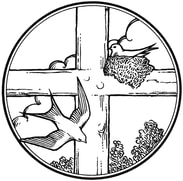 “You cannot serve God and money” (Matt. 6:24–34), for they require two contrary forms of service. Worry is the worship given to the false god of mammon, an unbelieving anxiousness and focus on the things of this world. Faith is the worship of the true God, a confident trust that He is a loving Father who will care for all of our needs in both body and soul. The widow of Zarephath served God—that is, she believed the word of the Lord spoken by Elijah that the bin of flour would not be used up nor would the jar of oil run dry (1 Kings 17:8–16). He who feeds the birds and clothes the flowers will certainly provide for our daily needs. For He has already provided for our eternal needs, clothing us with Christ’s righteousness in Baptism and feeding us His body and blood for our forgiveness. With such confidence we are liberated from worry and freed to do good with our material resources, especially to those who are of the household of faith (Gal. 5:25–6:10).
0 Comments
The Cry of Faith: Lord, Have Mercy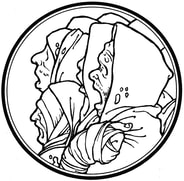 The ten lepers cried out from a distance, “Jesus, Master, have mercy on us!” (Luke 17:11–19). Their condition cut them off from God and others. So also do the works of the flesh cut us off from God and others. “Those who do such things will not inherit the kingdom of God” (Gal. 5:16–24). Thus we cry out with the lepers, “Lord, have mercy; Christ, have mercy; Lord, have mercy,” eagerly seeking His good gifts. Jesus said to the lepers, “Go and show yourselves to the priests.” And as they went, they were cleansed. So too, we walk by faith and not by sight, being confident of Jesus’ help before we see any evidence of it, trusting that Jesus’ cleansing words of forgiveness will restore us to wholeness in the resurrection. Let us be as the one leper who returned to the true High Priest to give Him thanks and glory. For Jesus bore our infirmities in His sacrifice at Calvary. His words are life to those who find them, and health to all their flesh (Prov. 4:10–23).
Jesus is Our Good Samaritan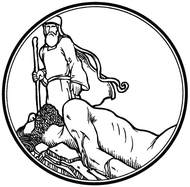 The Law cannot help us or give us life. Rather, it confines everyone under sin as wounded and naked before God (Gal. 3:15–22). So it is that two figures of the Law, the priest and the Levite, passed by the injured man on the side of the road (Luke 10:23–37). Only the promised Seed of Abraham can rescue us and make us righteous before God. Only the Samaritan, our Lord Jesus, had compassion, as did the Samaritans of old (2 Chronicles 28:8–15). He came down to us in our lost and dying condition, pouring on the oil and wine of the Sacraments. He placed us on His own animal, bearing our sin and brokenness in His body on the cross to restore us. Jesus brought us to the inn, that is, the Church, and gave the innkeeper two denarii, that His double forgiveness might continue to be ministered to us. In this way the Lord, by whose Law we are torn and stricken, heals us and revives us by His Gospel and raises us up with Himself.
Faith Comes from Hearing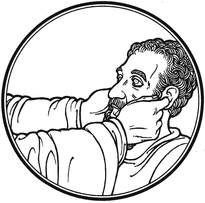
A man who was deaf and therefore also had an impediment in his speech was brought to Jesus (Mark 7:31–37). In the same way, all are by nature deaf toward God and therefore also unable to confess the faith rightly. For “faith comes from hearing, and hearing through the word of Christ” (Rom. 10:9–17). Jesus put His fingers into the man’s ears, and He spat and touched His tongue. Even so in Holy Baptism, water sanctified by the words of Jesus’ mouth is applied to us; and the finger of God, that is, the life–giving Holy Spirit (2 Cor. 3:4–11) is put into our ears in the hearing of the baptismal Gospel. Jesus’ sighing “Ephphatha” opened the man’s ears, and his tongue was loosed to speak plainly as Isaiah prophesied of the Messiah, “In that day the deaf shall hear the words of a book” (Is. 29:18–24) So also, He who sighed and breathed His last on the cross for us has given us to hear and believe in Him and has opened our lips that our mouths may declare His praise.
The Lord Lifts Up the Lowly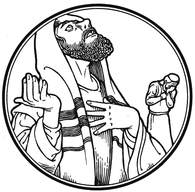
“And the Lord had regard for Abel and his offering, but for Cain and his offering he had no regard” (Gen. 4:1–15). For unlike Abel, Cain’s offering did not proceed from a heart that revered and trusted in the Lord. Thus, the lowly tax collector who prayed, “God, be merciful to me, a sinner!” was the one who went down to his house justified before God, not the respectable, outwardly righteous Pharisee who trusted in himself and his own good living (Luke 18:9–14). “For by grace you have been saved through faith. And this is not your own doing; it is the gift of God, not a result of works, so that no one may boast” (Eph. 2:1–10). The one who penitently despairs of his own righteousness and relies completely on the atoning mercy of God in Christ is the one who is declared righteous. For Christ died for our sins and rose again the third day (1 Cor. 15:1–10). Therefore, “everyone who exalts himself will be humbled, but the one who humbles himself will be exalted.”
Jesus Weeps for Jerusalem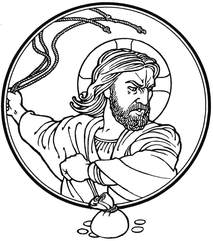
Our Lord wept over Jerusalem for the destruction that would soon come upon her. For she did not recognize the time of God’s visitation in Christ, who had come to bring her peace (Luke 19:41–48). Through His prophets God had consistently called His people to turn from their deceit and false worship. “But My people do not know the judgments of the Lord” (Jer. 8:4–12). They sought to establish their own righteousness rather than receive Christ’s righteousness through faith (Rom. 9:30–10:4). So it was that God was in His temple to cleanse it, a precursor to the once-for-all cleansing from sin which He would accomplish in the temple of His own body on the cross. God grant us to know the things that make for our peace—His visitation in the Word and Sacraments—that by the Holy Spirit we may penitently confess “Jesus is Lord” (1 Cor. 12:1–11).
Jesus Restores Paradise and Feeds Us Freely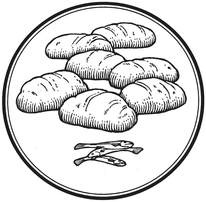
In the Garden of Eden, our first parents received food freely from the gracious hand of God, apart from any burdensome work (Gen 2:7–17). But after the fall, food would be received only through toil and labor. The curse declared, “By the sweat of your face you shall eat bread, till you return to the ground...” (Gen. 3:19). In other words, “The wages of sin is death” (Rom. 6:23). But into this wilderness world came Jesus the Messiah to restore creation. Having compassion on the weary multitudes, He renewed the bounty of Eden on the third day, freely granting an abundance of bread to the 4,000 (Mark 8:1–9). So also our Lord Jesus, having endured the burden of our sin, was raised on the third day to bring us back to Paradise. He now miraculously turns the bread of death into the Bread of Life in the Sacrament, giving you His very body and blood for your forgiveness. For “the free gift of God is eternal life in Christ Jesus our Lord” (Rom. 6:23).
Our Only Hope Is in Christ’s Righteousness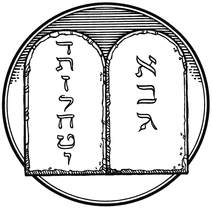
“Unless your righteousness exceeds that of the scribes and Pharisees, you will never enter the kingdom of heaven” (Matt 5:20). God demands nothing less than perfection and holiness from you in regard to His commandments (Ex. 20:1–17). Your only hope, then, is not in your own goodness but in the goodness of Christ, who did not come to destroy the Law and the Prophets, but to fulfill them for you. In Christ, your righteousness does indeed exceed that of the scribes and Pharisees. For you have been baptized into Christ’s death and your sinful nature crucified. Therefore, he who has died has been freed from sin (Rom. 6:1–11). You are now raised with Christ to walk in newness of life and to share in His resurrection on the Last Day. Christ has brought you through the baptismal sea “out of the land of Egypt, out of the house of slavery” (Ex. 20:2). Therefore, “consider yourselves dead to sin and alive to God in Christ Jesus” (Rom. 6:11).
Jesus Makes Fishers of Men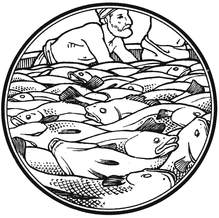
The Lord called fishermen to be fishers of men (Luke 5:1–11). The net they would use is the message of the cross, which is foolishness and a stumbling block to the world (1 Cor. 1:18–25). The power of God to save is not in spectacular signs like wind and fire and earthquakes (1 Kings 19:11–21), nor is it to be found in human intelligence and wisdom. The power of God to save comes in the still, small voice of the preaching of Christ crucified. In worldly darkness the disciples could catch nothing. But in the light of Christ, whose Word was attached to the water, the boats were filled with fish. So it is that in Baptism you have been drawn in to the ship of the Church. Though the nets are breaking and some who hear the Word do not believe, pastors continue to cast the net of the Gospel and the Sacraments, that Christians may abide in the boat of the Church and that we may be ready to give a defense to everyone who asks a reason for the hope that is in us (1 Peter 3:8–15).
Jesus Receives Sinners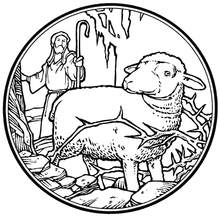
“This man receives sinners and eats with them” (Luke 15:2). The Pharisees’ statement of judgment against Jesus is in fact a proclamation of Gospel truth. For our God is one who delights in mercy, who casts all our sins into the depths of the sea through the cross (Micah 7:18–20). “Christ Jesus came into the world to save sinners” (1 Tim. 1:15). Those who refuse to be counted as sinners also refuse Jesus who came only for sinners. Those like the older son (Luke 15:11–32), who think they are righteous of themselves, will not join in the heavenly celebration over the sinner who repents and so remain outside of the Father’s house. Let us therefore be on guard against self–righteously trusting in our own merits. “Humble yourselves, therefore, under the mighty hand of God so that at the proper time He may exalt you” (1 Peter 5:6). Rejoice that Jesus receives sinners like us and that He still sits at table with us in the Holy Supper, bestowing His forgiveness and life.
|
Archives
February 2019
Categories
All
|
||||||||||||||||||||||||||||||||||||||||||||||||||||||||||||

 RSS Feed
RSS Feed
